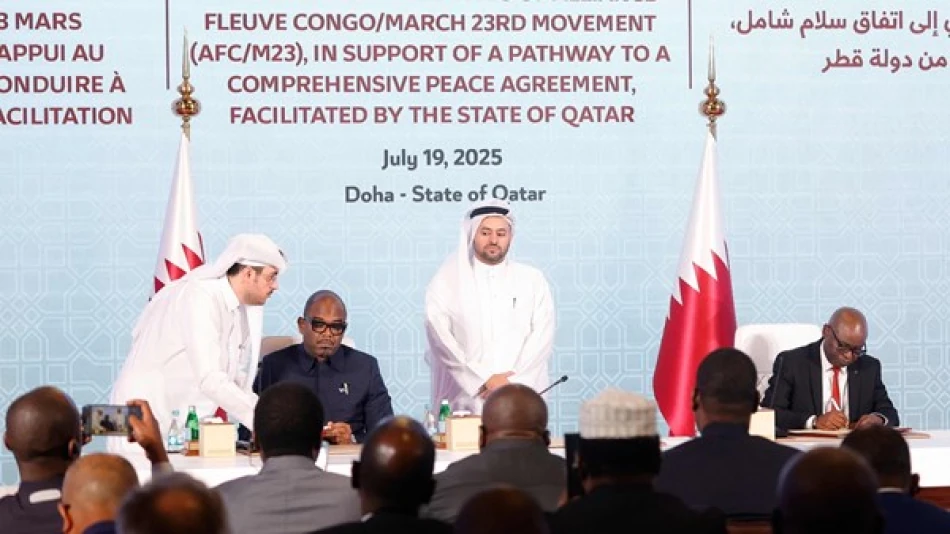
Congo Truce Signed: Ceasefire Agreement Aims to Restore Peace and Stability
Congo Peace Talks: Doha Breakthrough Signals End to Decades of Eastern DRC Instability
The Democratic Republic of Congo and the M23 rebel movement signed a landmark peace agreement in Doha on Saturday, marking a potential turning point in one of Africa's most protracted conflicts. After three months of Qatar-mediated negotiations, the deal establishes a framework for permanent ceasefire and state authority restoration in the mineral-rich eastern DRC, a region that has suffered from chronic instability for over two decades.
The Doha Declaration: Building on Washington's Foundation
The principles declaration represents the second major diplomatic breakthrough in recent months, following a separate peace agreement signed between Rwanda and the DRC in Washington last month. The timing suggests coordinated international pressure to resolve the interconnected conflicts that have plagued the Great Lakes region since the 1990s.
The agreement commits both parties to respect obligations for a permanent ceasefire, including an end to "hate promotion" and "any attempt to seize new positions by force." Qatar's State Minister for Foreign Affairs, Mohammed bin Abdulaziz bin Saleh Al-Khulaifi, emphasized that implementation responsibility lies with the conflict parties themselves, with built-in monitoring mechanisms to ensure compliance.
Strategic Implications for Regional Stability
Economic Stakes in Eastern DRC
The eastern DRC contains some of the world's largest reserves of cobalt, coltan, and other minerals essential for modern technology and electric vehicle batteries. Persistent conflict has prevented systematic extraction and created opportunities for illegal mining operations that often fund armed groups. A successful peace implementation could unlock billions in legitimate mining investments and transform regional economic dynamics.
Rwanda's Role and Regional Dynamics
The M23 movement, largely composed of ethnic Tutsis, has maintained alleged ties to Rwanda—a connection Kigali consistently denies. The group's call for new talks to address issues not covered in the Washington agreement suggests unresolved grievances that could undermine long-term stability if left unaddressed.
International Mediation: Qatar's Growing Diplomatic Influence
Qatar's successful mediation reflects its expanding role as a regional diplomatic broker, following high-profile interventions in Afghanistan and other conflicts. The three-month negotiation process in Doha demonstrates the Gulf state's patience and resource commitment to complex peace processes—a stark contrast to traditional Western diplomatic approaches that often prioritize quick fixes.
African Union Commission President Moussa Faki Mahamat welcomed the agreement as a "major milestone" toward permanent peace in the Great Lakes region, highlighting continental support for the diplomatic solution.
Implementation Challenges Ahead
The current agreement serves as a principles declaration rather than a comprehensive peace deal, with formal negotiations for a broader agreement scheduled to begin soon. Historical precedent suggests caution—previous ceasefire agreements in the DRC have frequently collapsed due to inadequate monitoring, competing economic interests, and external interference.
The roadmap for restoring state authority in eastern DRC will require substantial international support, including security sector reform, infrastructure development, and creation of legitimate economic opportunities for former combatants. Success will likely depend on sustained engagement from regional powers and international donors beyond the initial agreement signing.
Prospects for Lasting Peace
Unlike previous peace attempts that focused primarily on military solutions, the Doha process appears to address underlying political grievances and governance issues. The emphasis on formal state authority restoration suggests recognition that lasting peace requires functional institutions rather than merely silencing guns.
For the estimated 7 million internally displaced persons in the DRC, many concentrated in eastern provinces, successful implementation could enable return to productive livelihoods and access to basic services. The agreement's success will ultimately be measured not in diplomatic ceremonies, but in tangible improvements to civilian security and economic opportunity in one of Africa's most troubled regions.
Most Viewed News

 Layla Al Mansoori
Layla Al Mansoori






